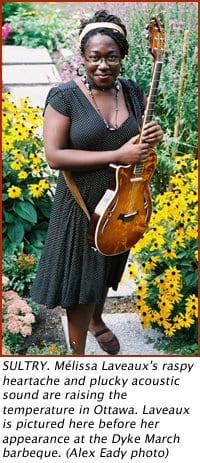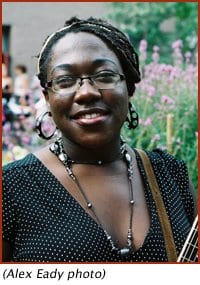When Mélissa Laveaux talks about the inherent contradictions in the title of her first album, Camphor & Copper, you can’t help but think she’s talking more about herself and less about her recording.
She describes how copper has an under appreciated beauty, and how camphor straddles the line between soothing and overwhelming.
The connection isn’t lost on her.
“It was a poetic self-commentary that reflected my low self-esteem,” says Laveaux, “but simultaneously about my deep knowledge of who I am and what I am.”
She seems to have made a recent career out of discovering who she is. In the span of only a few years, 22-year-old Laveaux has gone from a self-professed dorky teen trying to fit in at a French high school in Ottawa, to a respected Haitian-Canadian, queer singer-songwriter on the verge of making it big both at home and overseas.
The buzz surrounding Laveaux is quiet, but it’s growing thanks to an unbelievable stroke of luck that had Laveaux travelling to Paris this summer to record her CD, make a video, and play shows in The City Of Lights.
It’s the kind of big break that most unsigned artists can only dream of, and Laveaux calls “a miracle.”
In true Generation Y style, the story of Laveaux’s lucky break started on Myspace. Someone at independent Paris-based label No Format stumbled across her Myspace page and added her as a friend.
“I took it to be a complete fluke. I thought, ‘Yeah right, a label.’ I didn’t take it seriously,” says Laveaux. “Then I went to their website and saw they had Gonzoles on their label and thought, ‘Oh, well maybe they are serious!'”
Things moved quickly from there. Laveaux headed to Paris in July armed with the Camphor & Copper tracks she had recorded in Toronto and released independently in 2006. Songs and sounds were added to “re-imagine” the existing album, which will be re-released in its final form next spring under a new name.
Laveaux’s distinctive husky purr and folksy, soul-soaked guitar finger picking are distilled into her first full-length release in flawless form. Her symbolic lyrics twist between three languages: English, French, and Creole and cover topics as diverse as Greek mythology and break-ups.
While she acknowledges that some of her lover scorned lyrics are “whiney,” Laveaux says she likes to make fun of her angsty songs as a way to connect with the audience at her shows.
“Writing songs is so cathartic, so when I get to the show and play them I’m in such a good mood,” says Laveaux. “I’ll sing something that’s really intense and then be like, ‘Wow, that was fun!'” she laughs.
But Laveaux admits that playing in front of a crowd accompanied by “professional musicians” — which she doesn’t consider herself to be, yet — can be nerve wracking. She says it’s forced her to take her craft to another level.
“When I play poorly I feel bad because I have people who invest in me, not just financially, but they invest dreams and potential in me. When I absolutely lose hope, it’s really great to have someone else who will believe in me for a bit.”
Laveaux has come up with an innovative way to practice her songs and her audience banter at the same time — this fall, she’ll be busking on the streets of Ottawa.
Going from playing shows at Parisian bars to playing on the streets of Ottawa (and, of course, local venues) might seem like a downgrade for some, but Laveaux wouldn’t have it any other way.
She says she loves Canada and couldn’t fathom moving to Paris — although Toronto is an option.
“My drummer thinks it’s stupid — well actually, he thinks it’s crazy. He says it’s a great opportunity and I’m going to have people throwing shows at me across the continent, so why don’t I just stay in France for a year?”
Laveaux says her decision not to relocate was because of love.
“Originally, it was because I had a girlfriend in Toronto — but we’re not together anymore.”
Now, she’s adamant that she wants to go to grad school in Canada (“it’s cheaper”) and stay closer to her friends and family — an über-religious family that doesn’t know she’s gay.
“I’m still trying to get used to the fact that I’ll lose my family if I tell them,” Laveaux says. “When I tell them, they’ll put 22 years of their hopes and dreams in the garbage.”
“[My mom’s homophobia] used to make me cry, but then I’d argue with her about how the Bible was written by dudes at a different time, for different reasons. It barely even mentions homosexuality.”
Like any of life’s challenges, Laveaux channels that pain and frustration into her songs. It’s not always obvious what her lyrics allude to, but the pain and mystery in her voice shine through. And that’s the way she likes it.
“Your music is you in a moment,” says Laveaux. “A song isn’t all of you.”


 Why you can trust Xtra
Why you can trust Xtra


